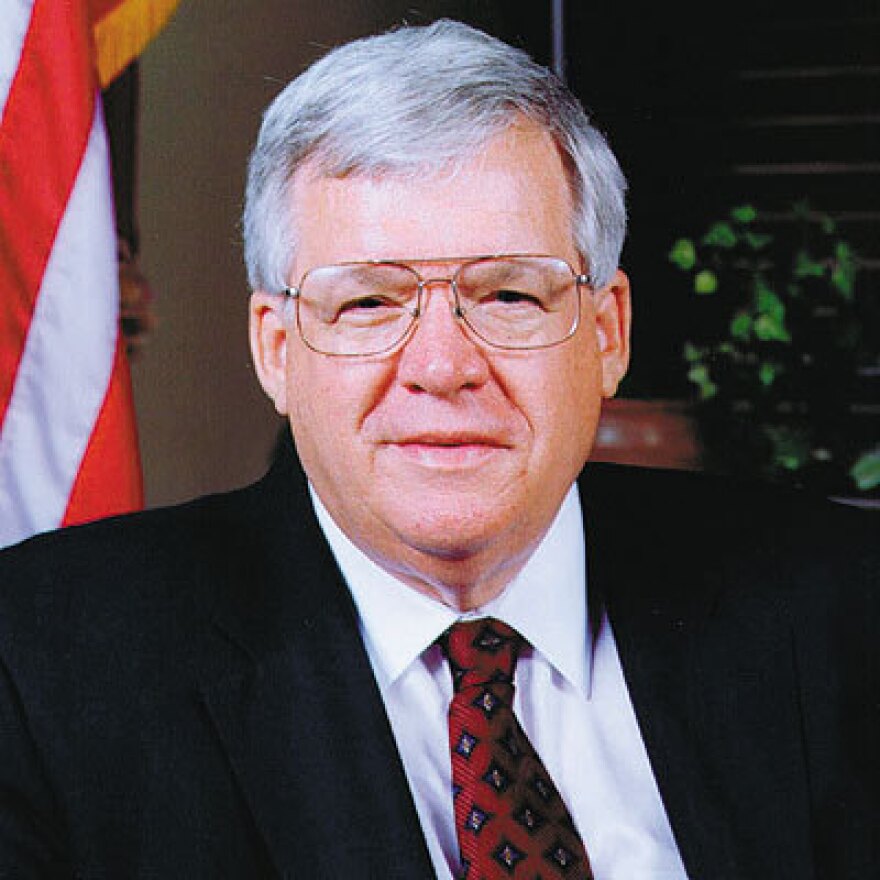Former U.S. House Speaker Dennis Hastert's brief appearance in federal court Tuesday did little to answer a long list of legal questions about the case against him, and even created some new ones.
The 73-year-old was in court in Chicago for the first time since a May 28 indictment said he agreed to pay $3.5 million to someone from his days as a high school teacher and wrestling coach not to reveal a secret about past misconduct. He entered pleas of not guilty to charges of violating banking laws and lying to
the FBI, each of which carry a maximum five-year prison term. But neither Hastert nor his attorneys addressed the facts of the case or spoke to throngs of assembled media.
A look at the arraignment and some of the legal issues:
JUDGE'S CONNECTIONS
The judge randomly assigned to the case, U.S. District Judge Thomas M. Durkin, said he'll let attorneys decide whether he should continue to handle it or be disqualified because of his connections to Hastert and the lawyers.
Durkin donated $500 to the ``Hastert for Congress'' campaign in 2002 and $1,000 in 2004. Before becoming a judge he worked in private practice with Hastert's son Ethan, who is also a lawyer. The two traveled together on some business trips, Durkin said, but added: ``I do not consider him a personal friend.'' Durkin also previously worked in the U.S. attorney's office with the two prosecutors on the case and Hastert's Chicago-based defense attorney, a former assistant U.S. attorney.
The judge also acknowledged his brother is the Republican leader of the Illinois House but said he is not a personal friend of Hastert, also a Republican. The judge said that in the mid-1990s he sent an email to a Hastert staffer expressing interest in a federal judgeship, but didn't hear back. (Durkin ultimately was recommended for the federal bench by U.S. Sen. Dick Durbin, a Democrat).
Durkin told attorneys that to the best of his knowledge he's never met Hastert, and he believes he can be impartial. But he said the decision should be theirs.
He disqualified himself from the case but gave lawyers until 4 p.m. Thursday to file paperwork saying they're willing to proceed with Durkin presiding. If both sides don't file the documents by the deadline, the case will be reassigned to another judge.
NEXT STEPS
Durkin didn't set another court date, but he did give Hastert another deadline: He has until June 23 to remove all firearms from his home in Plano, about 60 miles outside of Chicago.
Getting rid of the guns is among several conditions of Hastert's release on a $4,500 unsecured bond. He also had to turn over his passport and agree not to travel outside the continental U.S. and to not contact any victims or witnesses.
Defense attorney Thomas Green said Hastert was unable to remove the guns within the 48-hour deadline originally requested by the court because they belong to his two sons and are located inside gun safes. One son is traveling overseas on business and the other lives in Chicago, where gun laws prevent him from keeping the firearms.
'PRIOR MISCONDUCT'
There was no discussion in court about the secret Hastert allegedly sought to conceal by paying the still-unidentified person the indictment refers to only as "Individual A.''
A person familiar with the allegations told The Associated Press that the payments were intended to conceal claims Hastert sexually molested someone decades ago. Prosecutors do not describe the act underlying the case in the indictment, which some legal observers said was peculiar. The indictment does
offer a hint, suggesting that whatever happened may have taken place during Hastert's teaching and coaching years from 1965 to 1981 in Yorkville, a suburb of Chicago.
The indictment says FBI investigators questioned Hastert on Dec. 8, 2014, about withdrawing hundreds of thousands of dollars in cash at a time. It was his answer, he said he was keeping it at home because he didn't trust banks, that led to the lying charge.
THE LAW AT ISSUE
The banking law that prosecutors have invoked was primarily designed to catch drug dealers and other underworld figures laundering illegal proceeds.
The indictment alleges Hastert first started taking out $50,000 at a time but changed course when the huge withdrawals generated Currency Transaction Reports mandated under banking law, the indictment alleges. Hastert then began withdrawing increments of less than $10,000 to skirt the reporting ruling,
according to prosecutors.
Associated Press writer Eric Tucker in Washington, D.C., contributed to this
report.



